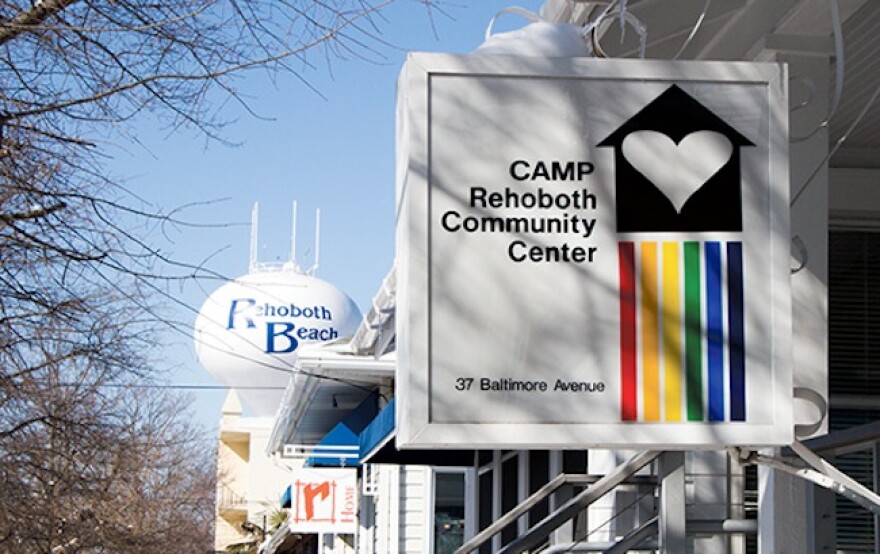Connecting with health resources is an issue many face in Sussex County— including LGBTQ seniors.
LGBTQ community service organization CAMP Rehoboth surveyed LGBTQ seniors in Sussex County over the past few years and found health resources lacking for this portion of the community.
Salvatore Seeley, manager of health and wellness programs at CAMP Rehoboth, says currently, some LGBTQ seniors, especially transgender seniors, seek healthcare outside of Sussex County.
“A lot of our folks who have the resources will travel to Philly or back to Virginia or to DC or Baltimore or even New York ... to go to their doctors,” he said. “Because they know they’ll get a better level of care that’s culturally specific to them.”
Seeley says LGBTQ seniors deal with many of the same issues as non-LGBTQ seniors in Sussex — primarily a shortage of providers and transportation challenges. But some issues are unique, like higher rates of HIV for gay men or mental health issues stemming from stigma.
"For women, there’s members of the lesbian community who don’t want to go to a gynocologist or regular physician to deal with women’s health issues,” he said. “Definitely we see more cancer rates because our community is not accessing healthcare, because they’re afraid of identifying who they are— they have a wife or a husband.”


Seeley says a lack of LGBTQ-friendly or culturally aware institutions can also mean going back ‘in the closet’ when entering an assisted living arrangement.
So CAMP Rehoboth is attempting to make LGBTQ-friendly healthcare more readily available in Sussex County— by training existing local providers and organizations that work with seniors on topics including LGBTQ history and gender identity and inclusion. CAMP Rehoboth encourages providers to carry LGBTQ-specific literature and post symbols such as the rainbow flag that indicate the institution is a ‘safe space.’
Seeley says as more LGBTQ seniors retire to the Rehoboth-Lewes-Milton area, many organizations are eager to learn how best to serve them, especially transgender and gender non-conforming seniors. “People are saying, hey, this is an unknown population, and how do we reach out to them, because they’re moving here more, and we don’t know how to work with this community.”
CAMP Rehoboth maintains an online database of LGBTQ-friendly healthcare providers. Seeley says the organization is working with La Red medical center to explore the idea of a LGBTQ-specific health clinic in the Long Neck or Milton area.

CAMP Rehoboth also works to build community for LGBTQ seniors, many of whom do not have children, through their “Silver Pride” group. Seeley says CAMP Rehoboth also hopes to expand its outreach in western Sussex County, where there are fewer resources for the LGBTQ community.
"That was evident in the last survey that we did last year, that we’re missing out on this community of LGBTQ people that live in Seaford or Laurel or Delmar that don’t have anything— not even any social gatherings,” he said. “They’re not connected. And they’re having to come either all the way over here or they’re just getting left out of services. They’re isolated.”
Helping LGBTQ youth ‘thrive’
CAMP Rehoboth is also gearing up for a program that aimed at LGBTQ youth.
A recent survey by the LGBTQ media monitoring organization GLAAD showed LGBTQ acceptance may be eroding among Americans ages 18 to 34.
But Seeley says the survey results seem narrow, and aren’t reflected in southern Delaware. “Younger kids, they just don’t care how you’re identifying gender or who you’re loving, they just want to be respected and they want to love who they love,” he said. “It’s older people that have become more problematic and causing more problems for our youth, especially around bathroom issues and trans issues.”
So he says support for LGBTQ youth in Sussex County — particularly the western side— is still needed.
This fall, CAMP Rehoboth plans to launch the “Thrive Program," funded in part by a grant from the Delaware Community Foundation, which will advocate for policy change at the school district or the state level.
Another goal of the program is to advocate for parents of LGBTQ youths. “We get so many calls here at CAMP Rehoboth—parents, especially around trans kids issues or gender non-conforming children—that teachers say something or other students say something, and administrators aren’t doing anything.”
The program will also support Gay-Straight Alliance clubs in schools and establish a mentor program for LGBTQ youth through a partnership with Big Brothers and Big Sisters.
Just like in its work with seniors, Seeley says CAMP Rehoboth hopes to expand youth outreach to western Sussex County.
“LGBTQ youth are very supported through the Cape school district or the wellness centers or through the Gay-Straight Alliances,” he said. “But once we go out of this area, they just don’t have that support network.”






